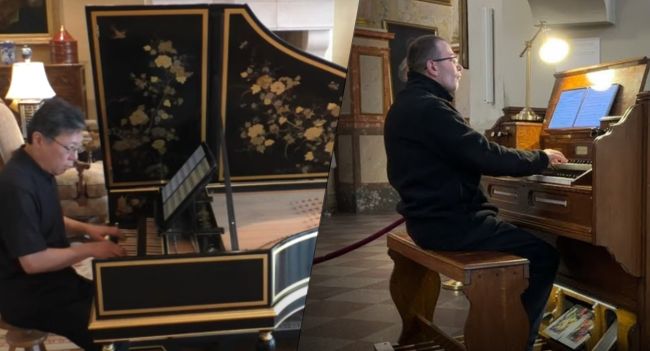It’s never a bad idea to start off the week with a medley of classical Bach on an ancient phonograph with a cup of morning coffee. For those enchanted by the timeless melodies of the legendary Johann Sebastian Bach and eager to experience them as they might have sounded in the Baroque era, there exists a niche but passionate ensemble instrument dedicated to this very pursuit.
Utilizing instruments that were contemporaries of Bach during the 17th and 18th centuries, these musicians offer a portal to the past. However, replicating Bach’s sonic landscape is a complex challenge, as not every instrument he composed has made it to our time. Among the lost treasures is the Lautenwerck, a unique instrument that bridges the gap between the harpsichord and the lute, celebrated for its trademark mellow, delicate tones.
One prominent figure in the realm of “lute-harpsichord” craftsmanship was Johann Nicolaus Bach, Johann Sebastian’s second cousin, renowned for his lautenwerck creations. These instruments bore resemblance to the familiar harpsichord but were exclusively strung with gut, producing a sound deeply evocative of the lute’s gentle resonance.
Today, the music of Johann Sebastian Bach on a lautenwerck can only be heard through meticulous reconstructions, as demonstrated by Dongsok Shin in a mesmerizing rendition of Bach’s Prelude, Fugue, and Allegro in E-flat, BWV 998, which you can hear above.
Dongsok Shin, in conversation with NPR, reflects on Bach’s ownership of two lautenwercks, suggesting their significance to the composer. “If he owned two of them, they couldn’t have been that off the wall. The gut has a different kind of ring. It’s not as bright. The lautenwerck can pull certain heartstrings,” said the Korean musician.
The unique timbre of gut strings, distinct from the brighter metal, resonates with a warmth that Shin describes as capable of touching the soul. The journey to recreate the lautenwerck’s sound involves a blend of musical archaeology and educated guesswork by the few craftsmen engaged in this endeavor, each striving to capture the instrument’s original voice.
NPR’s Neda Ulaby highlights these artisans as “forensic musicologists,” piecing together clues to resurrect the lautenwerck’s lost sound. If Bach himself could hear their efforts, one may wonder how he might react, centuries beyond his 336th birthday.
